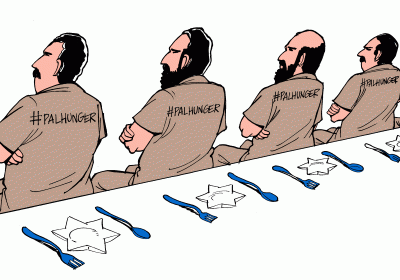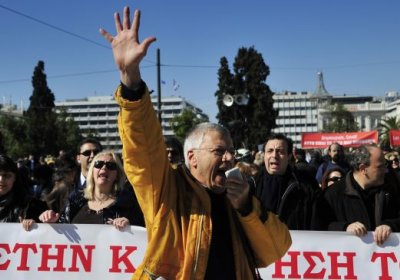Thousands of Palestinian political prisoners held in Israeli prisons have called off a hunger strike after winning several key concessions from Israel.
Solidarity protests have been staged in the West Bank and Gaza Strip, occupied Jerusalem, and Israel, and tens of thousands joined a rally in the town of Kafr Kana in the Galilee. Actions in solidarity with the hunger strikers have been organised around the world.
923
The rulers of the world are panicking over the results of Greek democracy.
The Party, The Socialist Workers Party 1960-1988, Volume II: Interregnum, Decline and Collapse, 1973-1988, A Political Memoir
By Barry Sheppard
Resistance Books (London), 2011
345 pages.
In the 1960s and 1970s, the United States Socialist Workers Party (SWP) was one of the most promising socialist organisations in any imperialist country.
Formed in the 1930s, it survived the isolating conservatism of the '50s to play a key role in building many progressive movements, particularly the fight against the Vietnam War.
There is no end in sight to violence and repression in Honduras. There is also no end in sight to the United States and Canadian governments and business maintaining political, economic and military relations with the country's military-backed regime.
Even after US Drug Enforcement Administration officers killed at least four Honduran civilians ― including two pregnant women ― in the name of the "drug war", two more journalists, Alfredo Villatoro and Erick Martinez Avila, have been killed in the Central American nation.
The Party, The Socialist Workers Party 1960-1988, volume I: The Sixties, A Political Memoir
By Barry Sheppard,
Chippendale, Australia: Resistance Books, 2005, 354 pages including index, with a rich collection of photographs.
The Party, The Socialist Workers Party 1960-1988, volume II: Interregnum, Decline and Collapse, 1973-1988, A Political Memoir
By Barry Sheppard
London: Resistance Books, 2012
345 pages including index.
The controversial Ramu nickel mine near Madang in Papua New Guinea has come under fire for new claims of environmental damage.
The mine has been the subject of a long-running battle with locals over plans to pump 100 million tonnes of mine waste into Basamuk Bay over 20 years. The dumping threatens the pristine ecosystem of the area as well as the livelihoods of local people.
The strike of post-secondary students in Quebec has taken a dramatic turn with the May 18 approval by the provincial government of a special law to cancel the school year at strike-bound institutions and outlaw protest activity deemed disruptive of institutions not participating in the strike.
Details of Bill 78 were unveiled the day before and debated in a special, overnight session of Quebec’s National Assembly.
About 100 unionists packed the Unions NSW Atrium on May 14 to discuss the right to strike campaign, at a fringe event of the Australian Council of Trade Unions (ACTU) Congress that began the same day.
Titled “Advance Australia Fair? Australian jobs and the right to strike”, the forum was sponsored by the Victorian Trades Hall Council. VTHC secretary Brian Boyd said it had not generally sponsored or organised ACTU fringe events, but this campaign warranted it.
More than 100 people rallied in King George Square on May 18 to commemorate the Palestinian Al-Nakba (The Catastrophe), when Israel was established with the mass expulsion of Palestinians from their villages and homes. Protesters held placards with the names of villages that were destroyed by Zionist forces in 1948.
Speakers condemned the Apartheid policies of the Israeli state from then until now. The rally was followed by a procession through city streets in double file.
Attorney-general Nicola Roxon is planning a raft of new powers for ASIO to intercept and store any individual’s information. The move follows the adoption of new laws that allow Australia’s spy agencies to target individuals and organisations that oppose the government's interests — nicknamed the “WikiLeaks amendment”.
Several proposed changes to telecommunications interception and access laws, as well as the Intelligence Services Act 2001, would expand ASIO’s powers of surveillance and reduce government oversight of ASIO activities.
- Previous page
- Page 2
- Next page








